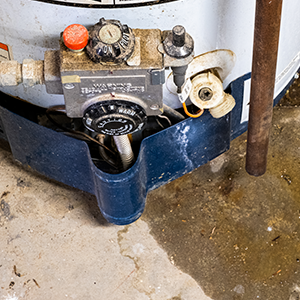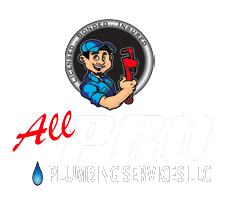How Can I Test My Water Heater?
Serving Hillsboro | Beaverton | Northwest Portland | Southwest Portland

As a homeowner in the Portland Metro Area, you rely on your water heater for various daily tasks, from hot showers to washing dishes. However, when your water heater starts acting up, it’s crucial to address the issues promptly. Regular testing is the key to ensuring optimal water heater performance and preventing potential problems. The professionals at All Pro Plumbing are here to help guide you through the importance of testing, safety precautions, and step-by-step instructions to help you measure how efficient your water heater is.
Visual Inspection of the Water Heater and How to Check for Leaks
Regular visual inspections are essential for ensuring the longevity and optimal performance of your water heater, preventing water damage, and maintaining its integrity. Here’s a streamlined guide on how to visually inspect your water heater for leaks:
- Safety First: Turn off all power sources to the water heater. Follow manufacturer-recommended shutdown procedures for a safe testing environment.
- Exterior Inspection: Check for water pooling around the base as a potential indicator of a leak.
- Tank Examination: Inspect the tank for rust or corrosion, especially at the bottom where corrosion commonly occurs. Remove and inspect the anode rod; consider replacement if heavily corroded.
- Pipes and Connections: Examine inlet and outlet pipes for corrosion or leaks. For gas heaters, inspect the burner assembly for rust or corrosion. Check the flue for rust or corrosion, especially at joints.
- Insulation Check: Inspect tank insulation for moisture, indicating a potential slow leak.
- Additional Checks: Examine the drain valve and heating elements (for electric heaters) for corrosion. Look for discoloration on walls, floors, or pipes as a sign of a slow leak.
- Detecting Leaks: Place paper towels around potential leak points; periodically check for dampness. Watch for slow dripping or continuous water drops.
- Expansion Tank Inspection: If applicable, check the expansion tank for leaks, which may indicate pressure issues.
Promptly addressing leaks is crucial to avoid water damage to your home and to maintain the overall efficiency of the water heater. Tighten loose connections, replace faulty valves, or seek professional help if needed.
Testing the Temperature and Pressure Relief Valve (TPR Valve)
The temperature and pressure relief (TPR) valve plays a crucial role in maintaining a safe water heater environment. Its primary function is to release excess pressure and prevent the water heater from reaching unsafe temperatures, thus safeguarding against potential explosions or overheating. Here’s how to test its functionality:
- Locate the TPR valve on the side or top of the water heater.
- Place a bucket or container underneath the valve to catch any water.
- Lift the TPR valve lever to open the valve manually.
- Water should flow freely from the valve, indicating that it’s working correctly.
- Release the lever, and the water flow should stop.
- If the valve doesn’t release water or continues to leak afterward, it may be faulty and should be replaced immediately.
Maintaining the right temperature and pressure settings prevents safety hazards and ensures efficient water heater operation. Follow the manufacturer’s recommendations for setting the thermostat to an appropriate temperature (typically around 120 degrees Fahrenheit) and ensuring that the pressure doesn’t exceed safe levels.
Additional Ways to Ensure Optimal Water Heater Performance
To ensure prolonged optimal performance from your water heater, consider the following practices:
- Mineral Buildup Checks: Assess water quality to pinpoint mineral buildup affecting the water heater’s performance, watching for unusual noises like popping or rumbling and discolored water as signs of accumulation.
- Flushing Your Water Heater Tank: Routinely flush the water heater tank to eliminate sediment buildup, safeguarding efficiency and preventing potential damage by maintaining a sediment-free tank. This practice enhances energy efficiency and prolongs the water heater’s lifespan.
- Checking Your Heating Element: Regularly test the heating element to ensure peak performance, swiftly addressing identified issues to prevent inadequate heating and curb increased energy consumption, sustaining efficient operation for a dependable supply of hot water.
When to Call a Professional Water Heater Technician
While homeowners can perform some water heater maintenance tasks, there are situations where professional intervention becomes necessary. Persistent leaks around the water heater, a complete lack of hot water despite proper settings, strange noises, foul odors, or extensive corrosion are all indications that professional intervention is necessary. Also, if your water heater is approaching the end of its typical lifespan (around 10-15 years for most models), it’s advisable to have a professional assess its condition.
Whether you’re dealing with leaks, heating issues, or any other water heater concerns, the team at All Pro Plumbing is equipped to assess, diagnose, and resolve the issues promptly. With our commitment to quality service, you can trust All Pro Plumbing for all your water heater needs – we’re just a phone call away!
Back to Water Heater Installation & ReplacementReady to Talk to Our Plumbers?
Click the button below to leave your information and our team will be in touch.
How Can I Test My Water Heater? in Northwest Portland, Southwest Portland, Beaverton & Hillsboro OR
Serving Washington County and West Multnomah County


